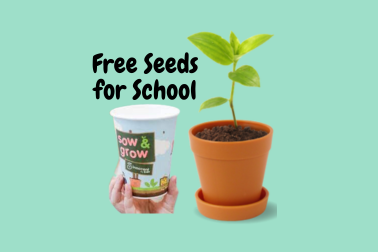
Claim your Free Seeds
In the modern education landscape, hands-on experiences are increasingly cherished, and what better way to connect students with nature than through gardening? Seeds have become a crucial educational tool, fostering lessons on biology, patience, responsibility, and environmental stewardship. Their widespread use in school curriculums has seen a surge in popularity, making them more than just tiny kernels but catalysts for growth in both plants and young minds. Now, the opportunity to obtain these seeds for free is not just a boon for school budgets, but a golden chance to sow the seeds of knowledge, nurturing a greener future for every student.
What is a Seed?
A seed is the matured ovule of flowering plants, encapsulating an embryo that has the potential to grow into a new plant under the right conditions. This small, often nutrient-rich package serves as both a protective shell and a food supply, supporting the initial growth of the young plant. The concept of a ‘seed' is not restricted to just a product; it's a brand in itself in the world of nature, representing life, growth, and potential. Its significance lies in its ability to perpetuate plant species, ensuring their survival and continued biodiversity. Across various cultures and industries, the seed stands as a symbol of beginnings, potential, and transformation.
Key Benefits of Free Seeds for School
- Educational Enrichment: The seeds provide a hands-on opportunity for students to learn about plant biology, the growth cycle, and the importance of agriculture in our daily lives.
- Promotion of Environmental Awareness: By participating in the planting process, students develop a deeper understanding of nature and the significance of environmental conservation.
- Health and Wellness: Understanding where food comes from can promote healthier eating habits. Students are more likely to consume vegetables they've grown themselves.
- Sustainability Education: Students not only learn about plants but also the broader concepts of sustainability, ecology, and the impact of human activity on the environment.
Retail Price of Seeds
The retail price of seeds in the UK varies widely, influenced by factors such as seed type, brand, treatment, origin, and where they're purchased. Small packets of common vegetable seeds typically ranged from £1 to £3, while specialty or rare seeds, including organic or heirloom varieties, could cost between £2 to £10 or more. For up-to-date pricing, checking online retailers, gardening catalogues, or local garden centres is recommended.
How to Claim Free Samples of Seeds for School in UK
- Research Promotions: Stay updated with garden centres, seed manufacturers, and agricultural organizations that often run promotions targeting educational institutions.
- Subscribe to Newsletters: Many seed companies and gardening organizations offer newsletters. Subscribing can ensure you're informed about upcoming promotions and giveaways.
- Join Gardening Networks: Engage with local gardening clubs or national networks like the RHS Campaign for School Gardening. They often partner with seed companies for giveaways.
- Visit Educational Expos: Educational and gardening expos may have stalls by seed companies offering free samples for schools.
- Social Media Engagement: Follow seed brands and related organizations on platforms like Facebook, Twitter, and Instagram. They might announce giveaways or contests on these platforms.
Frequently Asked Questions about Free Seeds for School
Are there any hidden costs involved?
While the seeds themselves might be free, some companies might charge for shipping or handling. Always check the terms and conditions before ordering.
What types of seeds are usually offered?
Most giveaways for schools focus on easy-to-grow and educational plants, including common vegetables, flowers, and herbs.
Are there limits to how many seeds a school can receive?
Often, there will be a set quantity provided to ensure that as many schools as possible can benefit. Details should be specified in the giveaway terms.
Conclusion
The initiative of distributing free seeds to schools transcends beyond a simple act of corporate generosity or marketing. It's an investment in the future – a tangible step towards instilling an appreciation for nature in the next generation. By granting schools the resources to immerse students in hands-on gardening experiences, we are not only enriching their education but also sowing the seeds of environmental stewardship, responsibility, and curiosity. Such efforts promise a more eco-conscious future, where today's students, nurtured by the seeds of knowledge and experience, blossom into tomorrow's guardians of our planet.

Leave a Reply